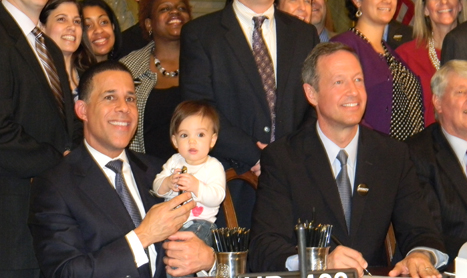Even as Gov. Martin O’Malley capped a major legislative victory Thursday by signing a bill that allows same-sex couples in Maryland to marry, opponents were already in the midst of a referendum process that will likely decide the law’s fate.
With O’Malley’s signature, Maryland joined seven states and the District of Columbia in legalizing same-sex marriage. But bill opponents are expected to succeed in putting the Civil Marriage Protection Act to referendum, which has proven to be a dead-end for similar laws in other states.
Supporters, though, were optimistic Thursday that public opinion is trending toward acceptance of same-sex marriage.
“No matter what happens, this is a historic point, but I think the mood of the state is changing” said Delegate Doyle L. Niemann, D-Prince George’s, after the bill signing.
“There’s a lot more support than people think,” he said.
While the 5 p.m. ceremony signaled the end of a yearlong battle in the General Assembly, it also marked a shift in focus, as both sides look to win over an electorate that seems just as divided on the issue as the legislature.

The State Board of Elections Wednesday approved language for the petition that same-sex marriage opponents will use to attempt to collect 55,736 signatures needed by midnight on June 30 to put the law to a statewide referendum in November.
The Maryland Marriage Alliance, partnering with lawmakers and other groups, will lead the referendum campaign, which will include media advertising, church visits and door-to-door canvassing.
“We will do our best to make sure we win this at the end of the day, whether that be media, whether that be print,” said Executive Director Derek McCoy after a press conference organized by opponents on Wednesday.
Delegate Neil Parrott, R-Washington, who successfully petitioned to the ballot a 2011 law providing in-state tuition to some illegal immigrants, will use his website, mdpetitions.com, to power the organization’s online petition drive.
“We’re supporting the infrastructure. We’re supporting on the back end, but on the front end, it’ll be Maryland Marriage Alliance,” Parrott said.
Same-sex marriage opponents have partnered with the Maryland Catholic Conference and the National Organization for Marriage, a non-profit which has been involved in similar high-profile ballot fights across the country, including California and New York.
But with recent polls showing a near-even split among Marylanders, supporters are gearing up for a campaign that will be just as hard fought as the effort to push the legislation through the House and Senate.
“We’re going to run a full-fledged campaign,” said Delegate Luke Clippinger, D-Baltimore, an openly gay lawmaker who was heavily involved in the House effort. “We anticipate getting our message out electronically and by TV, Internet, carrier pigeon.”
Supporters said O’Malley, who made the bill a key part of his legislative agenda, will continue to actively support the measure, should it reach the ballot.
But opponents who decried the governor’s lobbying, particularly in the House of Delegates, said the governor’s influence will not translate to the referendum stage.
“I don’t think the governor’s bag of tricks is going to be that deep,” McCoy said.
The O’Malley-backed bill won narrow approval in the House last month after two late amendments helped win the support of a few key delegates, including two Republicans. It then moved quickly through the Senate the following week.
The law is scheduled to take effect in January 2013.


You must be logged in to post a comment.